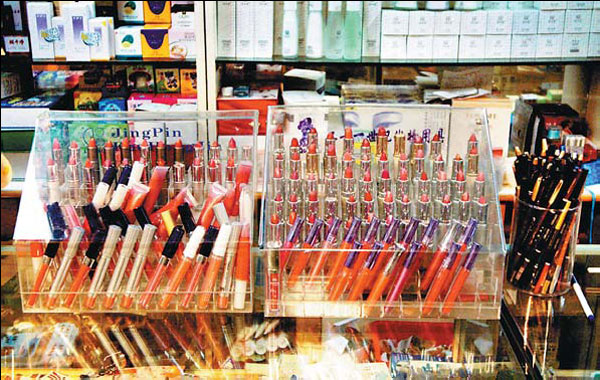'Lipstick effect' hits China as economy slows
Updated: 2013-05-20 07:40
By Shi Jing in Shanghai (China Daily)
|
||||||||
|
Sales of cheaper cosmetics, such as lipsticks, haven't been affected much by the slowing-down economic growth. L'Oreal Group, for example, saw its market share in China grow 11.2 percent in 2012 from 10.8 percent a year earlier. Li Bin / For China Daily |
People are less likely to stop buying fast-moving consumer goods because they are seen as daily necessities. Debnam added that it does not necessarily mean the money saved by not buying luxury goods will be transferred to the purchase of daily necessities.
He added when the economy declines, some people will start to buy "relatively less expensive lipsticks or makeup to make themselves feel good".
But he said he witnessed an improvement in the situation in the latter part of last year with sales gradually returning to normal, especially in Hong Kong. In the Chinese mainland market, he said things will get better probably in the second half of this year.
It's not just cosmetics involved in the lipstick factor. It includes movies, as witnessed by the popularity of Charlie Chaplin films during the Great Depression in the US in the 1930s.
According to the former State Administration of Radio Film and Television, China's box office sales hit 17.07 billion yuan ($2.74 billion) in 2012, surging 30.18 percent year-on-year and making the country the world's second-largest movie market.
The low-budget comedy Lost in Thailand, which debuted on Dec 12, took an unprecedented 1.2 billion yuan in less than one month, out-earning Avatar and Transformers: Dark of the Moon to become the highest-grossing movie ever shown in Chinese theaters.
"Imagine how much a young guy has to pay for a two-hour date, including dinner, shopping and everything else. Check out the labels of whatever brand in the department store. A sweater will cost as much as 1,000 yuan. A Prada bag will cost the guy about 10,000 yuan if he really wants to give his girlfriend a special gift. The date can be very expensive," said Liang Wei, founder and president of Beijing Magilm Pictures which specializes in marketing movies and is the largest company of its kind in China.
"But he can pay around 100 yuan for two for a movie, which can last around two hours. Time is killed easily and cheaply," he said.
Of course, there are many more options for recreation in first-tier cities such as Beijing, be it dining out or drinking with friends or singing karaoke. However, Liang said they all "require a certain mood to make sure everything is right".
"In cities, going to the movies is the easiest and cheapest pastime. Over time, Chinese audiences, especially younger ones, have developed the habit of regularly going to see movies," he added.
According to research conducted by his company, regular movie-goers, who watch films in theaters at least once a month, numbered 80 million in 2011. Box office receipts in China soared in 2012 partly because people went to the cinema as much as three times a month.
The market is expanding. In January 2012, the daily number of showings of films was 40,000. The number almost doubled in January this year, reaching 75,000.
"The capacity of the market has expanded. It is the same as supermarkets. If you can find a supermarket on your way to work, the amount you spend in the store will increase," said Liang.

 Michelle lays roses at site along Berlin Wall
Michelle lays roses at site along Berlin Wall
 Historic space lecture in Tiangong-1 commences
Historic space lecture in Tiangong-1 commences
 'Sopranos' Star James Gandolfini dead at 51
'Sopranos' Star James Gandolfini dead at 51
 UN: Number of refugees hits 18-year high
UN: Number of refugees hits 18-year high
 Slide: Jet exercises from aircraft carrier
Slide: Jet exercises from aircraft carrier
 Talks establish fishery hotline
Talks establish fishery hotline
 Foreign buyers eye Chinese drones
Foreign buyers eye Chinese drones
 UN chief hails China's peacekeepers
UN chief hails China's peacekeepers
Most Viewed
Editor's Picks

|

|

|

|

|

|
Today's Top News
Shenzhou X astronaut gives lecture today
US told to reassess duties on Chinese paper
Chinese seek greater share of satellite market
Russia rejects Obama's nuke cut proposal
US immigration bill sees Senate breakthrough
Brazilian cities revoke fare hikes
Moody's warns on China's local govt debt
Air quality in major cities drops in May
US Weekly

|

|








